Pence In Israel Says Republicans Will Again Dump JCPOA After 2024
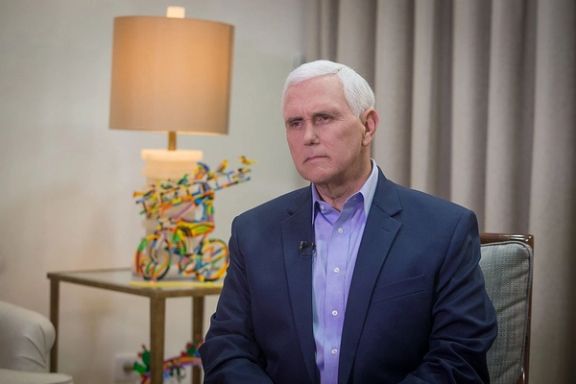
Former US vice president Mike Pence says the next American administration will be Republican and will again pull out of the nuclear deal with Iran.

Former US vice president Mike Pence says the next American administration will be Republican and will again pull out of the nuclear deal with Iran.
During a visit to Israel on Tuesday, Pence told the Israel Hayom newspaper “I believe that the Republican Party will win control of the House and Senate in 2022 and I believe we’ll win back America and the White House in 2024… we will have a Republican president, a Republican administration”.
“And if the JCPOA [Iran deal] finds a way to be resurrected, we will be a part and a voice of a chorus of Americans with that new administration coming into office to end the JCPOA just as quickly as we ended it under the Trump-Pence administration.”
He added that “We isolated Iran like never before, we challenged their malign activities…[and] it was our administration that took down Qassem Soleimani.”
Pence noted it was “incomprehensible” to him to see the Biden administration contemplating “buying oil from Iran while we’re cutting off oil and gas exploration in the United States.”
Pence also told Fox News from Jerusalem on Tuesday that “When our administration tore up the [Iran nuclear] deal, it’s because we recognized that not only did it not prevent Iran from obtaining a nuclear weapon, it guaranteed that they would be able to obtain a nuclear weapon in 10 years."
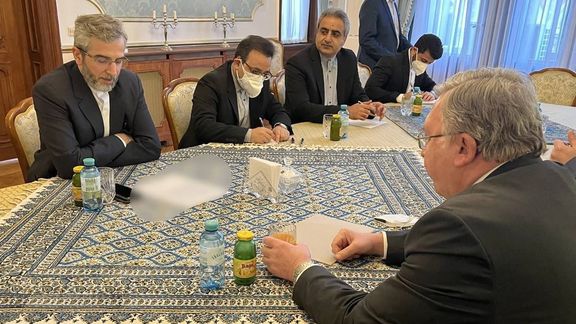
A senior Iranian politician says Tehran should start direct talks with Washington to cut out mediators like Russia who pursue ulterior motives in the nuclear talks.
The former chief of Iranian parliament's National Security and Foreign Policy Committee Heshmatollah Falahatpisheh told local media that the Russians wish to return Iran's nuclear dossier to the United Nation's Security Council.
In an interview with Khabar Online website in Tehran, Falahatpisheh also said that Iran should make sure Russia will not once again become the main player in Iran's diplomacy.
Russian Foreign Minister Sergey Lavrov's comments demanding the exclusion of Moscow's economic ties with Iran from the sanctions imposed on Russia by the West, has once again brought Tehran-Moscow relations under the spotlight, and created uncertainty in nuclear talks that diplomats worked for 11 months to shape.
He added that under the circumstances, it is in everybody's interest that Iran gets rid of mediators and engages in talks with the United States for better results.
In another part of the interview Falahatpisheh said it was a mistake by President Ebrahim Raisi to call Russian President Vladimir Putin on the first day of the Ukraine invasion. During the telephone conversation, Raisi expressed support for Russia's position in the war and blamed the West for the Ukraine crisis.
Falahatpisheh has warned that Iran should do its best to avoid the dangerous return of its nuclear case to the UNSC. The solution he suggested for this is maintaining direct dialogue with the United States. He said that it is the Russia’s policy to tie everything to the Ukraine crisis in one way or another. He also charged that Russian negotiator Mikhail Ulyanov did his best during the Vienna talks to prevent the shaping of an agreement between Iran and the West.
Russia has publicly backed the restoration of the 2015 nuclear agreement, the JCPOA and the Vienna talks.
Falahatpisheh suggested that Iran should not make itself a prisoner of history. "Tehran should see and understand modern history and find out that Russia is playing with it," he said, adding that the Russians have not contributed to Iran's bargaining power in the negotiations. Falahatpisheh also suggested that Iranians should not wait for Russia to make a move.
He said, however, Iran should not easily give up its nuclear program and its progress, like Libya did under Muammar al Ghaddafi or Ukraine did after the Soviet Union. "We know what happened to Libya and Ukraine," Falahatpisheh said, Iran should use its nuclear program as part of the country's development plan. Companies from all over the world can be Iran's partners to ensure economic growth.
Meanwhile, according to the reformist newspaper Sharq while an agreement with the West appears to be at hand, radicals at the Iranian Parliament (Majles) are expressing their opposition to what Iran’s negotiators have achieved in Vienna. According to Sharq, the radicals who constitute a small minority in the parliament, not only oppose the negotiating team, but they are also working against Iran's national interests. Sharq called the group, presumably the most radical elements of the ultraconservative Paydari party "The anti-agreement committee."
This comes while under the current circumstances and Russia's obstructionism, the negotiators need support from inside the Iranian political establishment more than before.
The committee members, wrote Sharq, bullied Foreign Minister Hossein Amir Abdollahian during his visit to parliament on Monday to brief the MPs. Sharq wrote that "independent and moderate MPs" did not show up at the meeting with the minister although they were invited to the meeting.
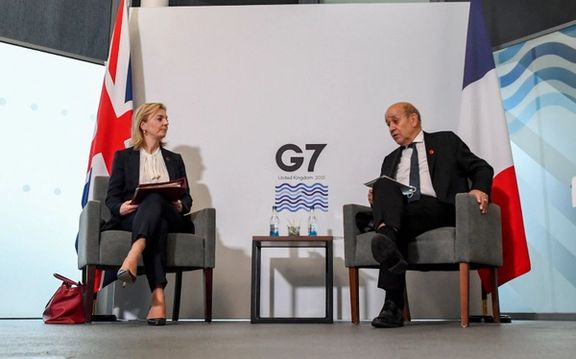
The three European parties negotiating revival of the 2015 Iran nuclear deal warned Russia on Tuesday not to complicate efforts to reach an accord.
In joint statement to the International Atomic Energy Agency’s Board of Governors, France, Germany and the United Kingdom called on Moscow not to “add extraneous conditions.”
Russian foreign minister Sergei Lavrov said Saturday Moscow was looking for guarantees that any sanctions against Russia over Ukraine would not affect “the regime of trade-economic and investment ties embedded in the Joint Comprehensive Plan of Action [the 2015 deal] on the Iranian nuclear program.”
With talks in Vienna over JCPOA revival between Iran and six world powers – the western European trio (E3), China, Russia and the United States – reportedly nearing their end, the Ukraine crisis has cast a shadow.
The E3 said the Vienna talks were “very close to finalizing a deal that would address our most pressing and immediate non-proliferation concerns, returning Iran’s nuclear programme [sic] to JCPOA limits as well as restoring…transparency measures…The window of opportunity is closing.”
The statement called on Iran to return to limits over uranium enrichment prescribed by the 2015 deal and to prepare “to dispose of its stockpile of enriched uranium in excess of JCPOA limits.” It has been widely assumed Russia would ship out the latter.
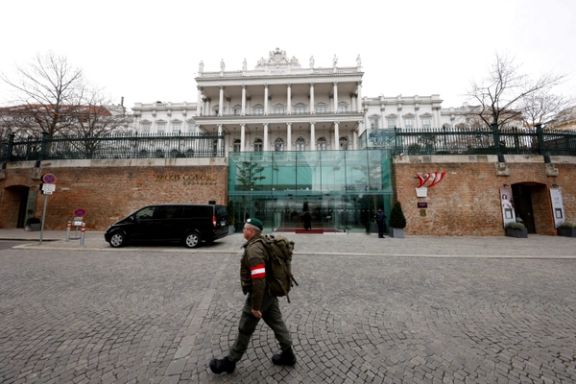
Iran’s deputy Foreign Minister Reza Najafi and its Geneva ambassador to the UN left Vienna for Iran Tuesday, Iran International reports, as nuclear talks ended.
This was a day after Ali Bagheri-Kani, Iran’s lead negotiator, left the Vienna nuclear talks and returned to Tehran for consultations. The other senior members of the Iranian team leaving the Austrian capital signaled the talks were over and that all parties now awaited decisions by politicians over reviving the 2015 Iran nuclear deal, the JCPOA (Joint Comprehensive Plan of Action).
Enrique Mora, the senior European Union official chairing the Vienna talks, tweeted Monday: “There are no longer expert level talks nor formal meetings…It is time, in the next few days, for political decisions to end the Vienna talks. The rest is noise.”
"We are very close to an agreement − it is essential we conclude while we still can," French Foreign Ministry spokeswoman Anne-Claire Legendre told reporters in a daily briefing Tuesday. "We are concerned by the risks that further delays could weigh on the possibility of concluding."
William Burns, the director of the US Central Intelligence Agency who played a central role in negotiations leading to the JCPOA in 2015, said success in reviving it would mark a "new era in our approach to Iran’s nuclear program.”
Raisi: red lines
Iran’s official news agency IRNA confirmed Tuesday there were no topics left to be discussed in Vienna, where Iran and six world powers have aimed to revive the JCPOA, and that all sides awaited decisions in Washington, Paris, London, and Berlin that could lead to an agreement within a few days.
Tehran has said it wants lifted all US sanctions incompatible with the JCPOA, including those introduced under other topics such as terror, violations of existing sanctions or human rights violations. It also wants guarantees that Washington would not again abandon the agreement, as it did in 2018.
“We have not retreated and will never retreat from any of the [country’s] red lines,” President Ebrahim Raisi (Raeesi) said Tuesday. “In the first step, the administration has seriously pursued neutralizing the sanctions and, in the second step, it seeks the removal of the sanctions during the negotiations in full dignity.”
On Monday, Iran’s Foreign Minister Hossein Amir-Abdollahian said Iran agreed with Sergei Lavrov, Russia’s foreign minister over his suggestion Saturday that any sanctions against Russia over Ukraine should not affect Russia’s ties with Iran. Russia is also expected to play a central role, especially in removing Iran’s enriched uranium stockpiles above JCPOA limits.
Blinken: shared interests
Some analysts in Iran have detected a Russian trap, while a French presidential official warned of Russian blackmail. But emphasizing the shared interest of the US and Russia in reviving the JCPOA, US Secretary of State Antony Blinken said during a visit to Estonia on Tuesday that Russia had an interest in blocking any possible Iranian path to a nuclear weapon.
"We continue to work to see if we can come back to mutual compliance with Iran on the deal,” Blinken said. “Russia continues to be engaged in those efforts and it has its own interest in ensuring that Iran is not able to acquire a nuclear weapon.”
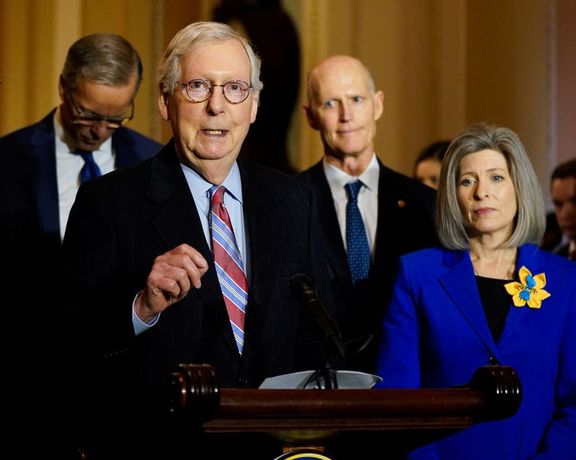
The Senate minority leader says US policies toward Iran is a concern for both Republicans and Democrats, calling for major hearings on Vienna nuclear talks.
Mitch McConnell urged the Senate Foreign Relations Committee on Monday to hold hearings before Washington reenters the nuclear deal with Tehran, saying that Congress should be consulted ahead of restoring the agreement.
Echoing earlier comments by committee Chairman Robert Menendez (D-NJ) to exert more pressure to restrict Iran’s nuclear program, missile program, and stop its attacks on American personnel and assets around the Middle East, McConnell said the decision warrants bipartisan consideration.
McConnell warned that if the administration aims to remove sanctions Congress should vote on it.
He noted that the imminent “sequel to the bad 2015 Iran nuclear deal” means “choosing weakness in the Middle East” because it is “an enormous step in the wrong direction”.
“It appears not to be a ‘longer and stronger’ deal as was promised, but a “weaker and shorter deal” that won’t “safeguard and increase our leverage over Tehran and its Revolutionary Guard”.
Referring to sevaral diplomats leaving the US negotiating team because of Special Envoy Robert Malley’s “going much too soft”, he asked the administration “to clearly explain its Middle East strategy”.
“I have encouraged them to push back strongly against Iranian aggression and contest growing Russian and Chinese influence in a region of significant interest to the United States”, he added.
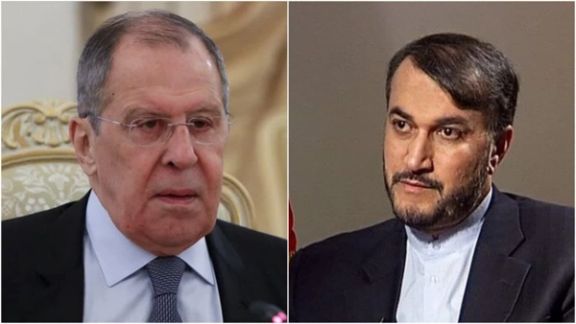
Russian demands that Ukraine sanctions should not impact its dealings with Iran have sparked controversy in Iranian media and calls to save the nuclear deal.
Russian Foreign Minister Sergey Lavrov has demanded guarantees from the United States to ensure that sanctions imposed on Russia will not affect trade between Tehran and Moscow has led to media warning the government against a "Russian Trap" and officials have been trying to make comments to save face.
Other observers such as Eurasia analyst Hassan Beheshtipour and IRNA chief Mohammad Reza Nowruzpour have also talked about the ‘Russian Trap’ in an interview with Khabar Online website.
Iranian Foreign Minister Hossein Amir Abdollahian said on Monday, March 7, that Iran will not allow any foreign element to undermine Iran's national interests in the Vienna talks.
This comes while Russia's ambassador in Tehran, Levan Dzhagaryan, told reporters that Iranians should not take reports by foreign radios too seriously. He was mindless of the fact that the comment was made by Lavrov, not any foreign radio.
Reformist daily newspaper Arman on Monday called on the Iranian government not to allow the nuclear deal with world power to be taken hostage by Russia, the country that wishes to use it as a bargaining chip in the talks with the West over Ukraine.
Iranian diplomat Hamid Abutalebi, a centrist politician, also called on the government to strike a strategic balance through direct negotiations with the United States in order to spoil the game that has been started by Russia.
Elsewhere Arman quoted Pir Mohammad Mollazehi, a seasoned political analyst, as saying that "it is time for a negative balance approach," adding that the Russians have an interest in boosting the tensions between Iran and the West.
Moderate conservative news website Khabar Online reported that Russia is offering its crude oil in the market with eye-catching discounts, and warned the Iranian government that Russia wishes to replace Iran in oil deals with China. Currently China is almost Iran's only customer and Iran reportedly sells its oil to China at a discount price. This comes while with the increased risk in transactions involving Russian oil, Iran is facing new opportunities in the global market for oil.
Hamid Hosseini, an energy market analyst and a member of the Iranian Chamber of Commerce told Khabar Online said that many countries have reduced their oil purchases from Russia without declaring any sanctions against Moscow. At the same time, insurance companies charge higher premiums for tankers carrying Russian oil, he said.
Hosseini said that the situation has made Iran effectively Russia's rival in the oil market. He added that Russia might offer its oil at a further discounted price in order to replace Iran in crude exports to China. He explained that the discount offered by Russia is twice as much the discount Iran is giving to Beijing.
Asked if under the circumstances an agreement with the United States is feasible, Hosseini said he believed a deal is within reach, and agreement may be finalized before the Iranian New Year in less than two weeks.
Hassan Beheshtipour, the Eurasia analyst, in his interview with Khabar online warned the Iranian government to adopt independent policies and avoid relying on foreign powers in order to protect the country's independence and territorial integrity.